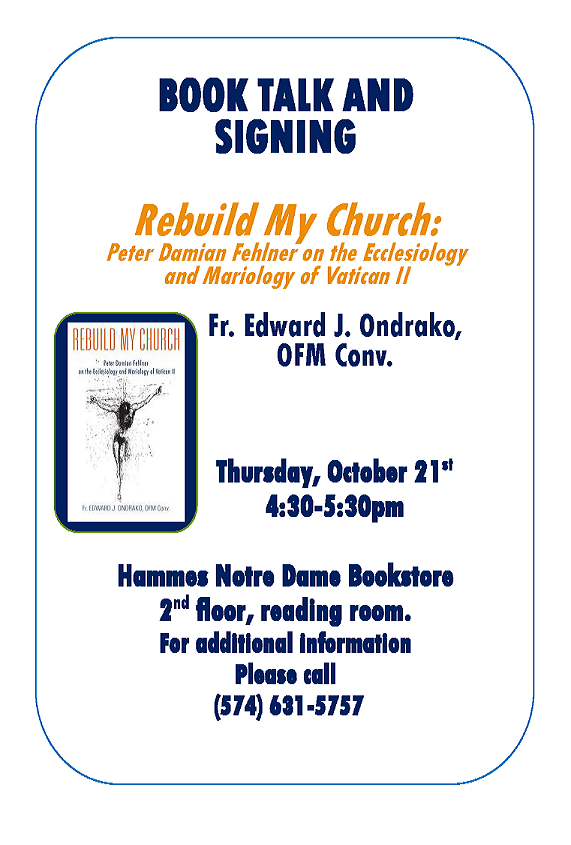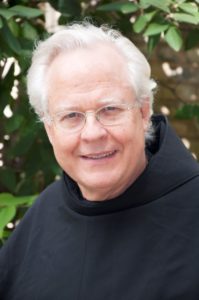 Rebuild My Church
Rebuild My Church
Rebuild My Church:[1] Inspiration and Content by Fr. Edward J. Ondrako, O.F.M.Conv.
Published 2 August 2021 ISBN 978-1-943901-18-0
- Origin and Tribute. With an eye on modernity, this volume critically engages the scholarly life’s work of an extraordinarily faithful follower of St. Francis of Assisi, Fr. Peter Damian Fehlner, O.F.M.Conv. (1931-2018). In 2012, the theology department at the University of Notre Dame encouraged me to research all of Fehlner’s writings. In 2017, I defended my conclusions before C O’Regan (advisor), J Cavadini and L Cunningham, the doctoral committee. Fr. Fehlner read the original chapters: ”You have represented the development of my entire life’s thought correctly.”
- The first edition of RMC, the fruit of four more years of Fehlner’s engagement of the history of Christianity and irreplaceability of Vatican II, amplifies his fertile thought and makes it fully accessible to the scholar and avid reader. His original insight into commonalities in the works of St. Bonaventure (d. 1274), Bl. John Duns Scotus (d. 1308), and, the surprise of surprises, St. John Henry Newman (d. 1890),[2] are an anchor for Newman – Scotus research.
- Emanation. Scholars, my publisher and chats with Fehlner’s acquaintances prompted a longer preface and introduction. I include the Protestant Reformation as revolution and resulting changes in the cultural atmosphere that are not unlike the cultural polarization of the twenty-first century. Fehlner weaves continuity of principles from Bonaventure to Duns Scotus, Vatican II and the Franciscan Marian principle. I engage C Taylor’s two-band theory of modernity to weigh losses and gains in the rotating of the axis of the world that constructs a “new world.”[3]
- John Duns Scotus – St. John Henry Newman. Commonalities weave throughout ten chapters. More biographical data on Fehlner and Newman clarify his connecting of these University of Oxford’s theologians. Fehlner addresses many misreads of Scotistic thought to make his case. Fehlner’s eye is always on what has a significant bearing on the future of Catholic theology. I add readings of Newman that threaten to undermine good theology.
- Content of Ten Chapters. Chapters 1 and 2 are a portrait of Fehlner’s life. Ch 1 navigates the twilight of modernity; ch 2 is his middle voice. Chapters 3 and 4 explain his appropriation of Bonaventure; ch 4 on the Trinity and the Franciscan School today. Chapters 5 and 6 clarify key concepts of Duns Scotus; ch 6, Duns Scotus’ Marian principle. Chapter 7 narrates the original discovery of the relationship of Duns Scotus to John Henry Newman. Chapter 8 engages modernity with Newman’s Christology and Mariology. I add chapter 9 as Fehlner’s theological response to the event in the life of St. Francis: “Rebuild My Church.” His thought offers an escape from the Hegelian web, the necessity of engaging Heidegger’s anti-Catholicism, and the doubleness of the gift of modernity. I add chapter 10 on why Fehlner matters, why his theology is prophetic, apocalyptic and aesthetic, his retrieval of the all but disabled Scotistic tradition, diagnoses of forgetting that is sanctioned by the Holy Spirit, remembering deeply and broadly,[4] his new “eyes” on Duns Scotus’ and Newman’s system of truths.
- Comparing with Judge Ken Starr.[5] Fehlner and I engaged in heart-to-heart conversations about critical engagement with our post-Christian culture. The temporization of Church authorities in the face of the secular invasion and inviting ideas into the Church communities without the competence of leaders to guide them Christianly, engender collective complicity in creating a post-Christian culture.[6] I compare Fehlner’s faith context to that of Judge Ken Starr, who shines a bright spotlight on the autonomy principle at the heart of religious liberty in America. An extra layer of constitutional protection exists for all faith communities. Faith and non-faith contexts have many external reasons that contribute to a post-religious and a post-Christian culture.
- Application. “God has sent the Spirit of his Son, into our hearts”; “You are no longer a slave, but a child, and if a child then also an heir, through God.” (Gal 4, 6, 7). Starr analyzes the erosion of religious freedom; freedom of speech; freedom of the press; and freedom of assembly as a retreat from our nation’s commitment. Fehlner, a Scotist, aligns with St. Maximilian Kolbe. Fehlner’s Theologian of Auschwitz[7] lays out the reasons why Kolbe is a Scotist. Rebuild My Church is a companion volume. Proving why Kolbe is a theologian was Fehlner’s life’s work.
- Inspiration. In his Testament, Francis of Assisi said: “The Lord gave me such faith in churches that I would simply pray and speak in this way: We adore you, Lord Jesus Christ, in all Your churches throughout the world, and we bless You, for through Your holy cross You have redeemed the world.” As Francis prayed before the crucifix, he took literally a message from Christ to “rebuild the Church.” He gathered rocks, mortar and funds to rebuild three small stone Churches that still exist. Our Lady of the Angels, the Little Portion or Portiuncula, became his favorite. There he founded the Order of Friars Minor, the Order of Poor Clares, received a papal blessing that visitors in perpetuity could receive a plenary indulgence, and died nearby on 3 October 1226. He passed over into God in a transport of contemplation and invites every spiritual person into a passing over and transport of soul.[8]
- A World Bled of Mystery. Without a sense of the invisible and mystery, it is impossible to understand sacraments as hardly reduced to rituals. For troubled times, St. Francis’ faith in priests is restorative. They must live according to the manner of the holy Roman Church, the holy mysteries of the Most Holy Body and Blood which they receive and which they alone minister to others. Theologians minister the most holy divine words of life.[9] Fr. Fehlner’s Franciscan spirit and life aligns with Judge Starr’s analysis of religious liberty under assault and the entire constitutional order of democratic debate under challenge and “cancel culture.” I found the way Fehlner presents Kolbe’s Scotistic method aligns too with De Lubac’s recovery of the Joachimite problem Bonaventure dealt with: the subtle uncoupling of Spirit and Christ, i.e., the failure to believe that the Spirit does not function to critique but to support the institutional Church and distribute its gifts.
Book Talk at The Hammes Notre Dame Bookstore October 2021; eondrako@alumni.nd.edu
[1] E. J. Ondrako, Rebuild My Church: Peter Damian Fehlner’s Appropriation and Development of the Ecclesiology and Mariology of Vatican II (Hobe Sound, FL: Lectio Publishing, LLC, 2021). www.lectiopublishing.com.
[2] E. J. Ondrako, The Newman-Scotus Reader (New Bedford, MA; Academy of the Immaculate, 2016, canonization issue, 2019), ch 7, 239-389. See p. 244 to compare Bonaventure, Duns Scotus and Newman. See p. 331 in RMC.
[3] C. Taylor, A Secular Age (2007). C. O’Regan finds Taylor, a Catholic, clear about what has come and what is gone.
[4] “Remember catholicity” fits Balthasar’s life works. See C. O’Regan, “Hans Urs von Balthasar and the Beauty of Forgetting,” in Church Life Journal, McGrath Institute for Church Life, U. of Notre Dame (24 August 2020).
[5] Ken Starr, Religious Liberty in Crisis (New York: Encounter Books, 2021), 169-170. To Starr, the unforgiveable offenses in modern thinking: “racist, sexist, anti-gay” are indictments even from books that are well documented.
[6] C. O’Regan’s expanse of historical-systematic theological thought interlocks with Fehlner’s Franciscan breadth.
[7] P. D. Fehlner, Theologian of Auschwitz (Hobe Sound, FL: Lectio Publishing, LLC, 2020).
[8] St. Bonaventure, Itinerarium Mentis in Deum; The Journey of the Mind to God, chapter 7, 3.
[9] St. Francis of Assisi, Testament: “We should honor and respect all theologians and those who minister the most holy divine words as those who minister spirit and life to us” (Jn 6:64).
Fr. Edward J. Ondrako, OFM Conventual
Research Fellow Pontifical Faculty of St. Bonaventure, Rome
Visiting Scholar, McGrath Institute for Church Life
University of Notre Dame
October 4, 2021
